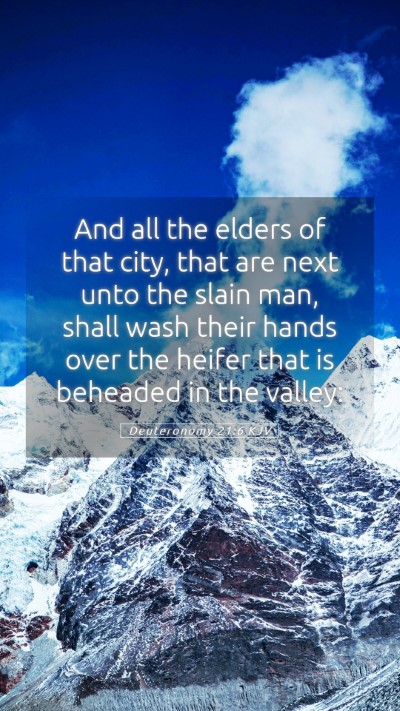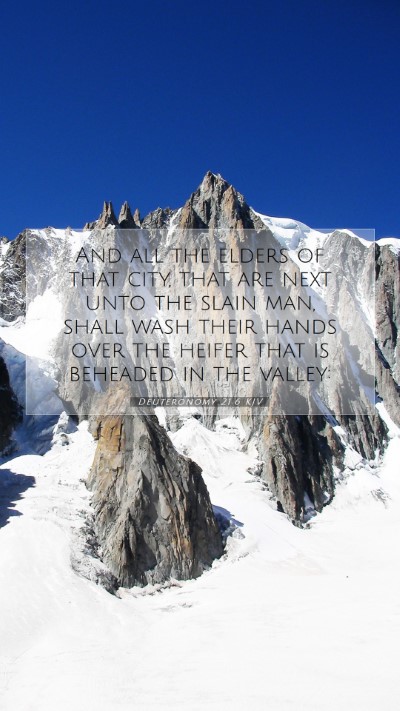Understanding Deuteronomy 21:6
Bible Verse: Deuteronomy 21:6 - "And all the elders of that city shall come out, and they shall wash their hands over the heifer that is beheaded in the valley." (KJV)
Overview
Deuteronomy 21:6 appears within a passage that addresses the solemn and significant rituals surrounding unsolved murders in ancient Israel. This verse specifically highlights the ritual act performed by the city elders when they find a body in the land without any indication of the murderer. It serves as a critical examination of justice, communal responsibility, and the theological implications of sin and atonement.
Bible Verse Meaning and Interpretation
- Collective Responsibility: The act of the elders washing their hands signifies the community's acknowledgment of their innocence regarding the murder, indicating that they are not complicit in the crime.
- The Heifer Ritual: The sacrifice of the heifer represents the gravity of the crime and serves as an offering to God to declare safety and innocence. This act serves to purge the community’s guilt.
- Call for Justice: This verse reinforces the concept that unjust bloodshed requires urgent attention and invokes a proactive response from community leaders.
- Symbolism of Cleansing: Washing hands symbolizes purity and a fresh start, allowing for the removal of guilt from both the individual and the community as they seek divine favor.
Commentary Insights
In understanding this passage, various biblical commentaries provide valuable insights:
- Matthew Henry: In his commentary, Henry emphasizes the ceremonial aspect of the washing of hands, noting that it was not merely a physical act but a profound declaration of the elders' commitment to justice and accountability before God.
- Albert Barnes: Barnes elaborates on the societal implications of this practice. He explains that the elders' role extends beyond mere authorities; they are accountable for the moral and spiritual well-being of their community.
- Adam Clarke: Clarke remarks on the procedural nature of the ritual, stressing its importance as a judicial practice aimed at preventing wrongful judgment while maintaining societal order and integrity.
Application in Contemporary Life
Though this verse stems from an ancient context, its principles of justice, accountability, and communal responsibility resonate widely today:
- Social Justice: The principles of collective responsibility challenge individuals and communities to confront injustices and seek accountability in societal issues.
- Cleansing Rituals: The symbolic act of washing hands can serve as a reminder of the need for moral integrity and the importance of coming clean in matters of personal and community ethics.
Cross References
This verse is connected to several other passages that enhance understanding through comparative scripture analysis:
- Exodus 21:12-14 - Discusses the consequences of murder and accountability.
- Numbers 35:33-34 - Addresses the importance of justice amidst shedding blood.
- Psalms 26:6-7 - Emphasizes the act of washing hands as an expression of innocence.
Conclusion
Deuteronomy 21:6 holds significant lessons about justice, responsibility, and the depths of community engagement in spiritual practices. For anyone exploring bible verse meanings or seeking bible study insights, this verse stands as a compelling reminder of the sacredness of life and the collective duty to uphold justice.


